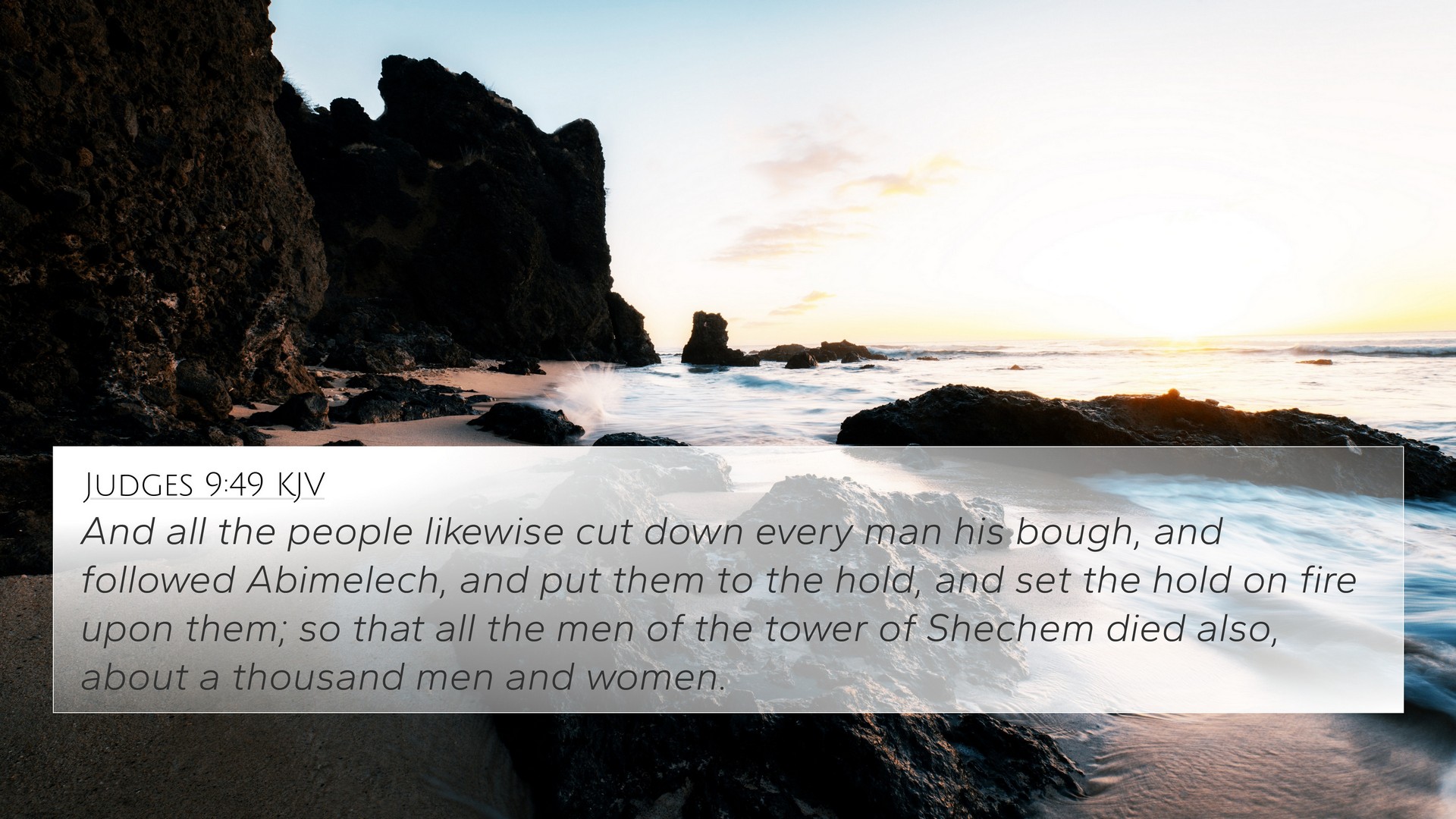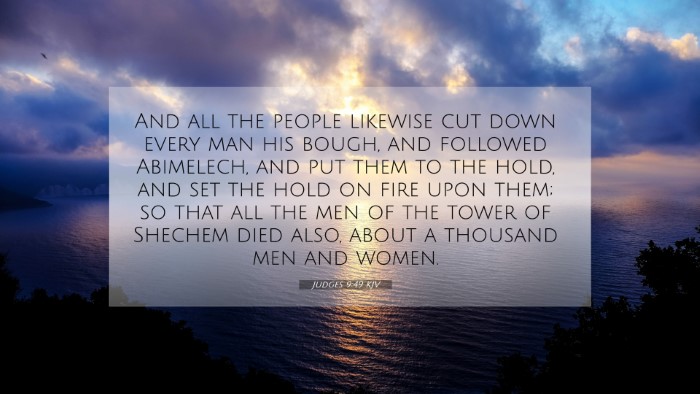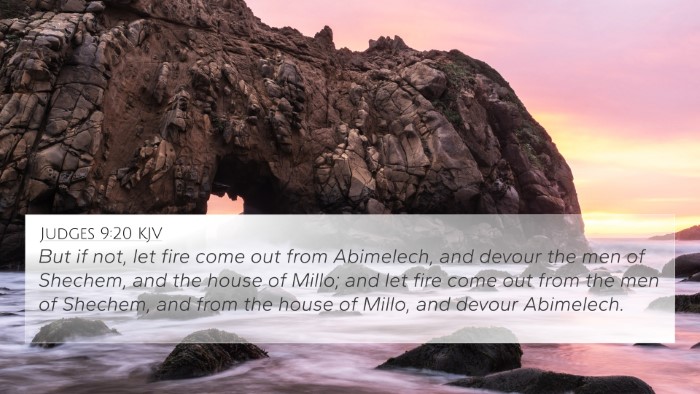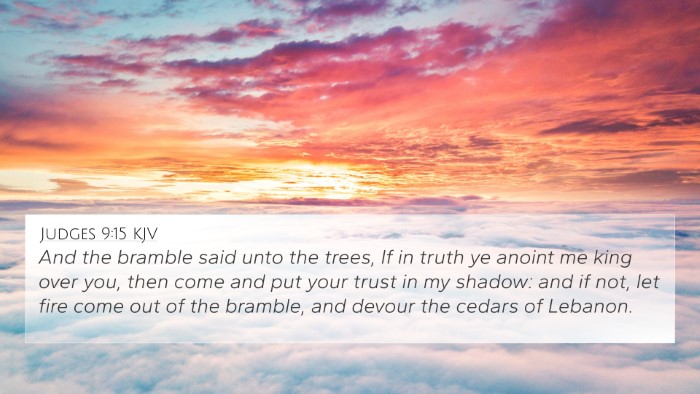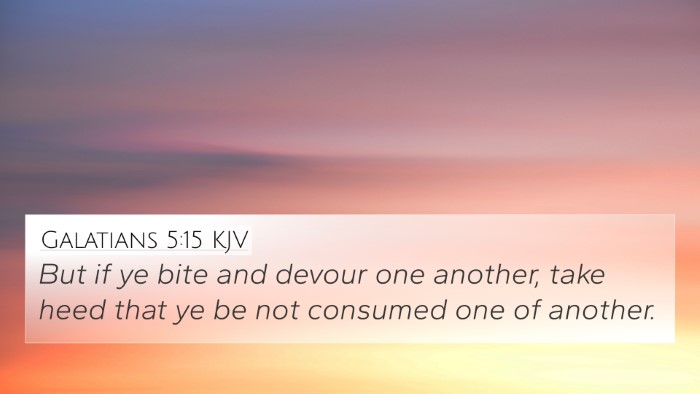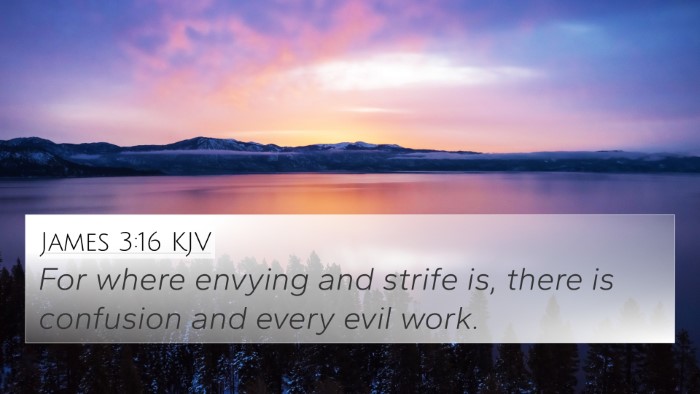Understanding Judges 9:49
Judges 9:49 states, "So they cut down every man his bough, and followed Abimelech, and put them to the hold, and set the hold on fire upon them; so that all the men of the tower of Shechem died also." This verse follows a narrative of conflict and destruction, illustrating the severe consequences of civil strife and the desire for power.
Summary of Meaning
This verse recounts the decisive and violent aftermath of Abimelech’s siege against the city of Shechem. The imagery of cutting down boughs symbolizes the preparation for a siege and the lengths to which men will go when led by an unworthy leader. The emphasis on fire signifies both destruction and finality.
Commentary Insights
-
Matthew Henry:
Henry indicates that this act represents the culmination of Abimelech’s ambition and the treachery involved in his rise to power. The use of fire illustrates the irrevocable nature of their actions and the dire outcome of rebellion against divine order.
-
Albert Barnes:
Barnes expands on the deliverance of justice through divine will—indicating that while Abimelech appeared victorious, those in the tower would not escape judgment. He notes that this act embodies a natural consequence of the chaos that ensues during internecine conflict.
-
Adam Clarke:
Clarke views this as a pivotal moment of despair for Shechem's inhabitants, highlighting the brutality of Abimelech's campaign. He implies that their destruction serves as a warning against ungodly leadership and the folly inherent in supporting a tyrant.
Cross-References and Thematic Connections
Judges 9:49 resonates with various themes found in scripture concerning leadership, rebellion, and divine judgment. Below are significant Bible verses that establish connections:
- 2 Samuel 18:15: Details a bloody conflict similar to that which occurred in Shechem as David's sons vied for power.
- Psalm 37:20: Reflects that the wicked will perish, comparable to the fate of Abimelech's opponents.
- Lamentations 2:21: Offers poetic lament about destruction, echoing the despair found in Judges 9:49.
- Jeremiah 9:21: Alludes to the inevitable destruction caused by sin, paralleling Shechem's fate.
- Galatians 6:7: "God is not mocked; for whatsoever a man soweth, that shall he also reap," reinforcing the principle of divine justice.
- Isaiah 10:33-34: Discusses the judgment of lofty trees, serving as a metaphor for downfall similar to the destruction in Shechem.
- Revelation 21:8: Discusses the fate of the unfaithful, paralleling the severe consequences illustrated in Judges 9.
Thematic Analysis of Judges 9:49
Connections between this verse and others highlight several important themes:
- Leadership and Responsibility: The destructive outcome of Abimelech's tyranny serves as a reminder of the moral obligations held by leaders. Cross-references can be drawn to Proverbs 29:2, which states, "When the righteous are in authority, the people rejoice: but when the wicked beareth rule, the people mourn."
- Divine Judgment: As seen through thematic verses such as Numbers 32:23, which speaks to the repercussions of sin, the narrative underscores the notion that evil deeds are ultimately subject to consequences.
- Despair and Loss: Emotional depth is mined from verses such as Ecclesiastes 3:3, which discusses the time for all things—including destruction—reflecting the heavy burden felt by the people of Shechem.
Conclusion
In conclusion, Judges 9:49 serves not only as a historical account but as an enduring lesson on the nature of power, the repercussions of rebellion, and the guarantee of divine justice. The verse acts as a lens into the eternal struggle between good and evil, leadership and responsibility, resonating through both the Old and New Testaments.
